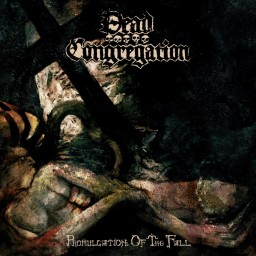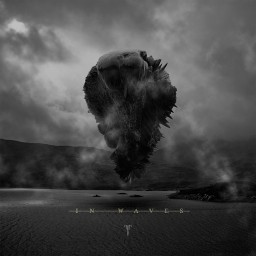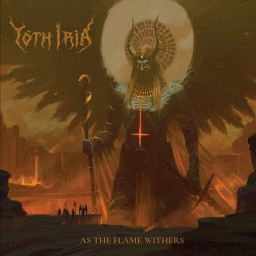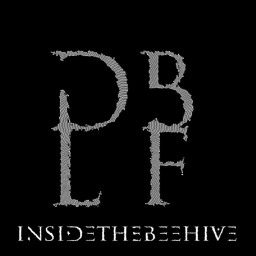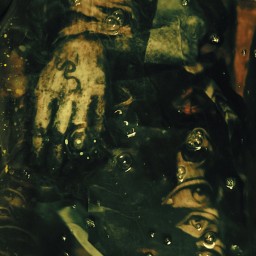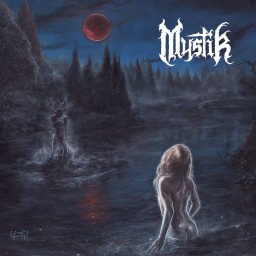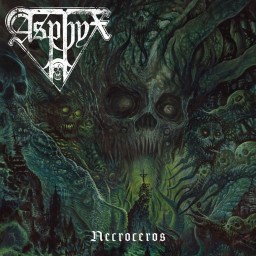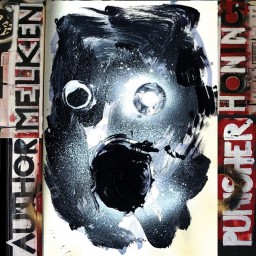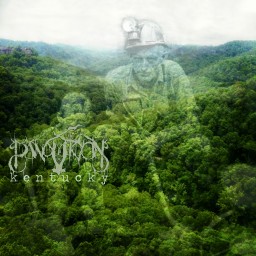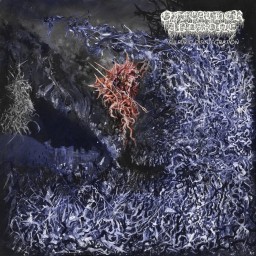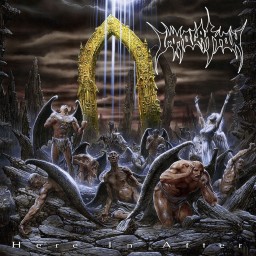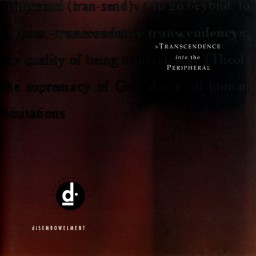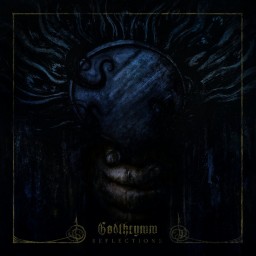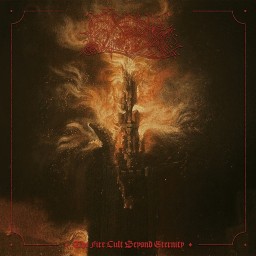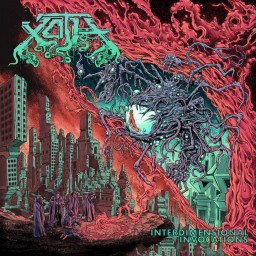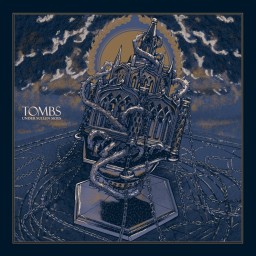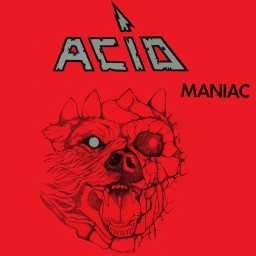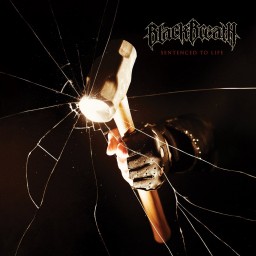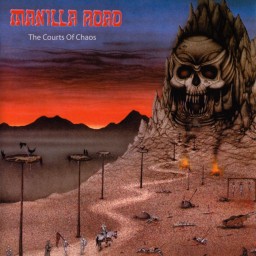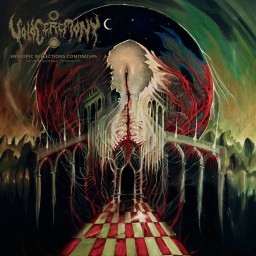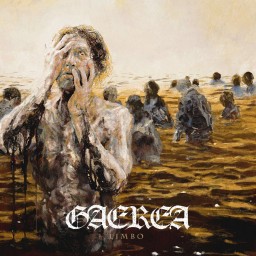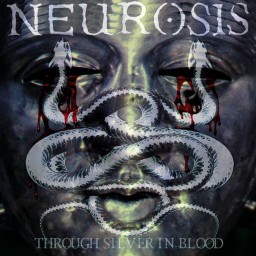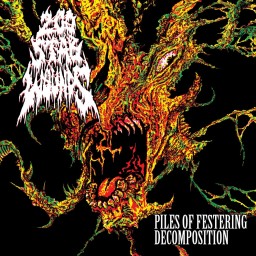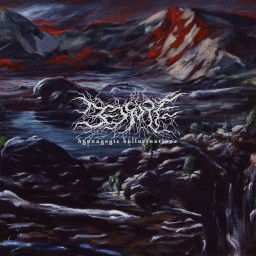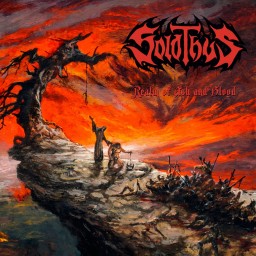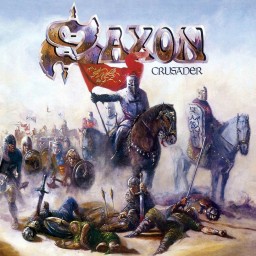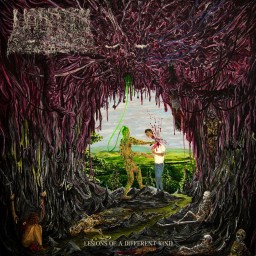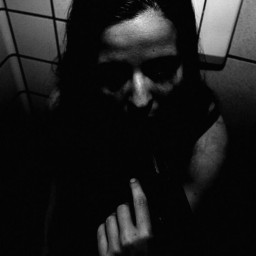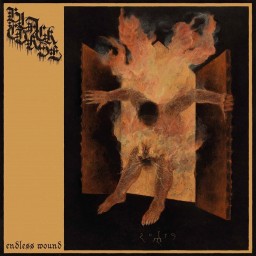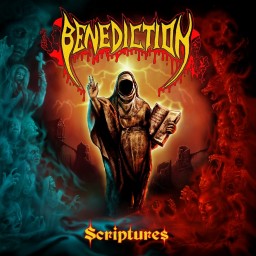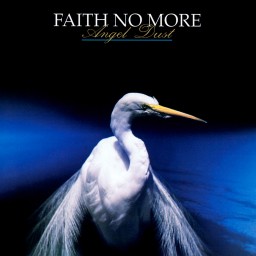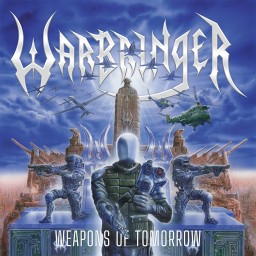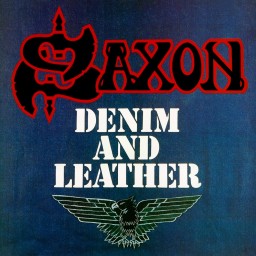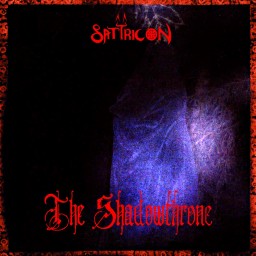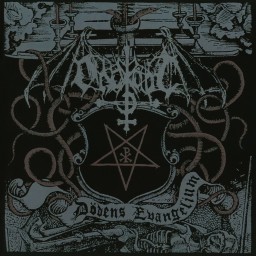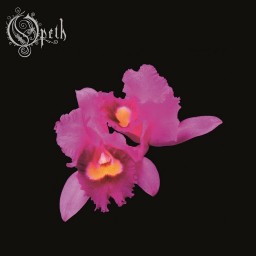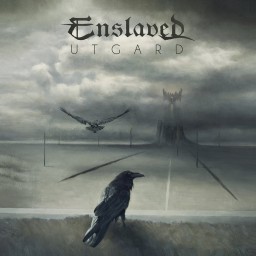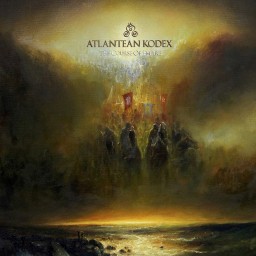Vinny's Reviews
Greece in terms of metal output is more commonly associated with black metal with its own brand of Hellenic BM an internationally recognised sound from a country that has given us such greats as Varathron and Rotting Christ. When it comes to other genres of metal, more specifically death metal the options for well-known bands are limited to Septic Flesh and Dead Congregation and their styles really are opposites.
The symphonic grandiosity of SF is far removed from the darker and more doomy death metal sound of Dead Congregation. Unafraid to throw in repetitive and consistent riffs, Dead Congregation present as a behemoth in the death metal stakes with a sound reminiscent of Incantation in their slower-paced moments yet also able to churn out the frantic urgency of Immolation on the same track or album.
Promulgation of the Fall showcases this penchant for a wide exploration of death metal brilliantly. Blasting away with a Morbid Angel like level of intensity whilst at the same time able to capture a real spirit of having enough in the tank to go in for the death/doom pummelling on tracks also. Tracks like Serpentskin feel like they go on for about ten minutes when in effect they only last half the time which shows how well they are able present that measured approach to their song writing and album composition to challenge you on how you think genres/sub-genres should overlap.
Tracks end quickly with the next track starting immediately after, dialling the pace and tempo up or down considerably in the process making you constantly have to adjust as a listener which if done wrong can leave you pretty disorientated and for me what these hairpin turns do is show that this is a death metal that commands your attention. I can see how you can easily get lost with this record if trying to fill the background only. You need to focus on the whole experience to wring all the life from this record. There's cool lead work here, that seep melancholy just as well as they sear eardrums with their sonic explorations. The riffing has a groove to it at times that is as infectious as it is horrifying. The drums when not blasting like machine guns run intelligent fills and it feels like there's always something going on just beneath the surface of the skin with the percussion overall.
The only downside is how much it sounds like Incantation but that's a criticism so easy to level at most bands nowadays that it's hard to often see past that comparison, but as I mention above there is so much more going on here than death/doom royalty worship.
Genres: Death Metal
Format: Album
Year: 2014
My first venture into Trivium and melodic metalcore in general hasn't been an all round success. That isn't to say that this record is awful but I do have to temper the tone of my review with the caveat that this style of music doesn't appeal to me on so many levels. In the main my tastes are more extreme and so this combination of clean vocals and frenzied bursts of energetic riffing that lacks enough bite for my ears is always going to present a challenge.
Let's start off by acknowledging that I completely understand why people enjoy this album and indeed the band overall. There's so much memorability here it quickly becomes infectious and if this oppositional attitude that the band chooses to deliver its music via is your bag then your itch is most definitely scratched with this. There's not enough hours in the day for me to ever get Watch The World Burn out of my head before the bedtime. This stickiness to the record is one its major successes; that and the fact that this song writing literally sings to the soul of its disaffected audience.
The problem I have is that the record is so consistent it feels almost programmed and processed lacking any real depth or soul. For all the aggression and obvious passion that sits behind the music it leaves no emotional footprint on me as a listener. There's no feeling that Trivium share anything with me and therefore although I don't exactly come away empty handed, I don't have much to show for my effort of listening.
I don't deny it has mass appeal but it is not a record that holds any lasting appeal for little old me.
Genres: Metalcore
Format: Album
Year: 2011
When a band is made up of two former members of Rotting Christ it is very easy when listening to their debut to draw comparison to the Hellenic BM legends. The fact is though that Yoth Iria sound like Rotting Christ so much that even if you didn't know the background ahead of listening to As The Flame Withers (unless you had never heard Rotting Christ of course) then comparisons are inevitable. Worth mentioning that Jim Mutilator was also bassist in Varathron at the time of His Majesty... and therefore has credentials beyond just working with the Tolis brothers. His counterpart here is the equally well-experienced George Zacharopoulos who has bands such as Necromantia and Thou Art Lord in his past and ongoing experience. In short, these boys know their stuff.
The good news here as that Yoth Iria are not just RC clones. Yes, they do capture the lush and rich melodies of Triarchy... era RC and they present that sound superbly adding gothic atmospherics and subtle yet attention-grabbing structures to their debut. What they also do however is add some splendid straight-up heavy metal riffs and tempos into the mix to produce much variety also.
In doing so the already warm Hellenic BM sound is emboldened by these soaring riffs and pounding pace and it gets the wings to keep pace with them making for a memorable and yet still suitably dark experience. Check out the Burzum-like bonging chimes on The Red Crown Turns Black coupled with the doomy approach to the guitar melodies and repetitive riffs that control much of the mid part of the song yet either side of this there's a rampant and charging sprint to the main part of the track that balances really well over all.
By far the most recognisably black metal content here is the grim vocal delivery of George. They sit perfectly in the mix, audible alongside the instrumentation and atmospherics without ever seeing one detract from the other. Although a new name to me, George Emmanuel did a superb job on the mix and mastering of the record. The drums on here are handled by the well-travelled Maelstrom and his guest appearance brings a level of assuredness to the bands sound that holds a restraint that feels necessary to let the guitars and vocals lead the charge but at the same time the drums aren't lost either.
Clocking in at just under fifty minutes, Yoth Iria's debut release feels a concise and well constructed affair that stays in the brain well after the needle comes off the vinyl. It isn't exceptional and in a way that is the appeal here. It captures the best of the experience of the band and delivers a release that shows much promise for further output to come.
Genres: Black Metal
Format: Album
Year: 2021
Despite my many years of listening to music and having nearly 3 decades to mature and learn to give all genres, sub-genres and styles of metal a chance, I still have this annoying trait of telling myself I am going to hate something before I listen to it. Now, I am not entirely in love with Inside The Beehive and their spazzing riot of math and grind but I am suitably impressed enough to take the time to write a review.
I don't often venture to the Revolution Clan (see my opening comment above to understand why) but this release transcends mere rebellion against conventional metal. It is a release that flourishes greatly within a relatively short play time and shows a band with a great understanding of texture in their music. Amidst the stabbing frenzy there is an almost constant sense of form still, some basic structure that gets elements moulded around and slammed onto it. It's like a very scalable foundation level that can be subjected to intense and sustained levels of obliterating fury and it still maintains integrity throughout.
The best way I can find to describe it would be to say this is the eye of the storm and at the same time is the constant, violent swarm that swells around it, driving its own growth and expansion. This in essence is its downfall also as there are times during the release where there is a feeling of the album trying to cover too much ground. The overtly core sounding elements do grate a tad and it loses the grind element a little to readily in favour of these elements which leaves me conflicted about the overall piece.
Considering grumpy old Macca would have had me dismiss this had I not resisted, this is a decent find and one that hopefully will help me to learn to put that character in his box more readily in future and actually find some new shit to like.
Genres: Grindcore Metalcore
Format: EP
Year: 2011
As the boundaries and edges of metal and music in general continue to be pushed and stretched, almost inevitably the influence of the past moves along with this innovation regardless of the pace or momentum at the time. It's fair to say that roots go along way back and unless you are going to do something really avant-garde and genre defining (genre-creating perhaps?) the relevance of influence is a key component in most band's repertoire regardless of how unique their approach or sound. I should go on record here as saying I like Mestarin kynsi very much. I like its boldness, its depth and its refreshing approach to structure.
Another reason I enjoy the record so much is because it reminds me some damn much of Hawkwind that there's times when i have to check I am not listening to Space Ritual. Like Hawkwind, I feel Oranssi Pazuzu are an acquired taste, not for everyone perhaps but when you do avant-garde this well then you can afford to be niche with your audience. Mestarin kynsi goes beyond mere psychedelia and atmosphere though, it plays like a macabre dance ritual overall. Some soundtrack to the most bizarre of rituals that aims to shift the very fabric of time around you.
What the album does brilliantly is shift through gears effortlessly, jumping from deep atmospheric incantations into progressive structures and dark, black metal intensity in the course of mere minutes yet never letting anything slip out of place, maintaining the revs in gear so nothing feels like it is running away with itself. For all the expansion in tracks there's still the feel of a foot hovering over the brake pedal at all times ready to ease up when required without ever needing an emergency stop.
Melodies soar as leads burst like solar flares on tracks and the atmospherics cleverly track these bursts superbly, raising songs to new heights. The whole album has a feel of organic growth, like a jam session started in the 60's that is still going some sixty years later. It doesn't feel bloated though, which was my main concern going into the record. Although some tracks do stretch the nine or ten minute mark, overall the album is listenable in one sitting and often feels like variances on a theme as opposed to always being unique tracks each time. I'm sold.
Genres: Avant-Garde Metal Black Metal Post-Metal
Format: Album
Year: 2020
It is nice when you find a band who are utterly unapologetic for wearing their influences on the sleeve. The authenticity and sheer earthiness of Mystik is infectious to anyone who has ever heard any Warlock or Acid record, yet they are more than just worship of speed metal and trad metal bands, they are clearly accomplished musicians and connoisseurs of an art form that should never be allowed to die.
The furious gallop of their debut album rarely lets up. From the opening track you are taken on a whirlwind of racing riffs, pounding drums and gruff and curt vocals courtesy of the superb Julia von Krusenstjerna. The lead work is melodic and fluid, matching the overall intensity of the record as it leaves you with little doubt of its intention to do anything other than wrap the listener in a big warm blanket of the eighties. You can hear all the component parts of the instrumentation also, whether it is the thundering drums or the rumbling current of the bass as it presses harder on the gas to really drive the engine along, the guitars revving the engine with their frenzied riff patterns.
There's anthems here to keep your head occupied for hours after you finish playing the record. Ancient Majesty and Gallows Hill deal with their macabre subject matter with rasping choruses, chanted at the listener and etched into your brain without the need for any great range from the vocalist. The industriousness of the band is breath taking, nearing relentless at times in terms of the energy levels on display. The album relies on a simplicity in terms of structure, giving you banger after banger with fantasy-fuelled content to compel the inner nerd to sit upright and pay attention.
The emergence of female fronted (in fact the majority of Mystik are female) metal bands that are able to tap into the rich vein of traditional metal and raging speed metal is something I welcome and this is simply essential listening for me. Mystik have laid down a firm foundation stone to what I hope will be a long and illustrious career. My only criticism is that it is very "samey" overall, even with the variety they throw in through melody and structure and so probably a seven track album would work better in reality, but still a very good debut.
Genres: Heavy Metal Speed Metal
Format: Album
Year: 2019
If I am honest from the outset of this review my first few listens of Necroceros (like Rhinoceros apparently) left me with a couple of challenges. As a band who are responsible for some of my favourite doom/death releases there was an element of disappointment at the more melodic and accessible sound that presented itself on Asphyx's first album for five years.
This in part I guess is due to them letting “Seeb” Leverman undertake mixing duties as opposed to the regular butt cheeks of Dan Swanö occupying the chair behind the mixing desk. Whether it is Leverman’s power metal influences shaping things or simply conscious changes in the writing (I suspect both) Necroceros sounds like the band are exploring a variety of riffing options, whether it be the stabbing melodic death metal influences of Molten Black Earth or the big open rock sounding riffs of Mount Skull, this is not the familiar territory of Asphyx to my ears.
The quality of the song writing is still there and epic monstrosities such as Three Years of Famine and the title track that ends the record give me enough assurance that Asphyx are not going all Amon Amarth on me. Although not as up-tempo overall as previous outings, the record maintains variety well, launching straight into the opening track with a vigour that belies the ages of the band members. Tracks are well paced and those harrowing melodies from the guitars are littered throughout the album as familiar melancholic totems for old fans like myself to latch onto.
The second challenge I mentioned right at the start of the review is to do with the amount of filler on what I must note is a very front-loaded album. Beyond track six I find most subsequent songs just pass me by and although the closing of the album is strong, I do not feel the title track flexes its full musculature and sounds weaker than it probably actually was intended to be. This overall dilution of the album just leaves me with a sense of frustration in that although this is not a terrible album, it lacks the familiar bite associated with the artist and concerns do get heightened that this is a directional shift that will escalate across future albums.
Genres: Death Metal
Format: Album
Year: 2021
As I continue my non-linear narrative with Author & Punisher I find more and more textures being applied with each release I consume. This eight track release from 2015 being now the fourth album from Shone's discography feels a lot more contemplative and deep than other outings I have witnessed. Not that any of these reflective and pondering aspects are done at the expense of sheer banging intensity mind you, more that the album itself feels like a congruent entity, that the tracks all belong together.
The realm of industrial metal isn't the most vast in terms of scope (not that I pretend to be an expert on the genre) but what Melk en Honing has in abundance is attitude to amplify its use of industrial music. It is a record that clearly has something to say and uses all the mood and intensity over its fifty-three minute length to great effect. Tracks build consistently, instead of relying on just raw throbbing and racing pulses coupled with pounding and looping percussive assaults to force you into submission. There's a real sense of accomplishment to the progression of tracks, like they have been written thoughtfully and real attention paid to detail. None of this quality control makes for a dull or boring record; quite the opposite this has an emotional yet calculated delivery and a real sense of connection with Shone himself.
In its more harsh and abrasive moments Melk en Honing is scarring and uncomprehending yet in the throes of building tracks it is explosive and compelling at the same time. Like the rampant scribing of a Richter Scale machine in a magnitude 8.0 earthquake, music jabs across the page in sharp and violent surges, blunted by low-end bass lines that swell beneath the build of trajectory.
It feels like there's more vocal content here this time around and again this is well-balanced in the overall mix. The vocals hold some horrific semblance of tune played deliberately slowly to add an alien ethereality to them that is probably the main take from the record that stays with me post-listening. Tristan Shone continues to impress as I explore his discography in my albeit scattergun approach that I take.
Genres: Industrial Metal
Format: Album
Year: 2015
Kentucky gets touted as the "breakthrough" release for Panopticon but I have to say it has taken me a good near decade to get to grips with it and its combination of folk, bluegrass and black metal elements. Without going into too much detail, if the album cover doesn't give it away, the subject matter for the album is the labour struggles in mining in (fittingly) Kentucky with a heavy focus on the film-documentary Harlan County, USA from which many samples are used to great effect.
It is a challenge to get the balance of samples right in a record. They all too easily clash in my experience and can quite quickly become a distraction that detracts from the music itself. However, Panopticon give a masterclass in the application of the samples here, using the black metal elements to give them a real sense of drama and the bluegrass and folk elements to underline the real human aspect to the stories also. As such it is an album you feel compelled to listen to in its entirety in order to do both the record itself and the stories real justice.
The styles of music all have a relevant place here and all are firmly placed across the record with 3 tracks being folk covers and 3 being predominantly black metal (Black Waters sits as some ambient track towards the end - again adding depth; some reflection as the album draws to a close). This combination of genres works well overall on the album as a whole but on individual tracks the transitions don't always feel they are executed cleanly and whilst never sounding clunky as such they do keep the record off full marks on the rating.
For such a passionate subject matter there's a feeling that the storytelling is done sensibly and the album feels that more sincere and authentic to the cause as a result. It's sparked an interest in me to go and watch the documentary and learn more which is what good music should do I suppose. My initial reservation some ten years ago upon first hearing this seems nonsensical now and is evident of my lack of musical maturity at the time because overall this works and is one of the few albums in recent years i have truly connected with.
Genres: Black Metal
Format: Album
Year: 2012
Of Feather and Bone's unrelenting approach to death metal first crossed my path with their sophomore full-length Bestial Hymns of Perversion back in 2018. Bestial by name and bestial by nature the album felt oppressive but lacked focus; like it was blasting for blasting's sake so to speak. With album number three the trio appear to have managed to better keep a lid on things. The album is still batshit crazy in places but there is also a measured pace to most tracks that allow expansion as well as much needed respite.
With riffs that mine the very ground around them and a percussion section that does a nice job of clearing any debris from their fallout, the band show versatility in being able to chug it out when necessary as opposed to relying on sheer face-shredding intensity to deliver their point. There's grindcore in here for good measure along with a definite blackened edge to proceedings to give the whole sound a swarming yet also at times cavernous delivery.
The vocals are of the sickened, guttural variety that just hint at a black metal style around the edges to mix things up in that department also. Like the album artwork there's a constant sense of activity, of endless depravity and unyielding horror. The lead work when deployed is chaotic and lightning quick, adding just enough sonic input to show these guys have heard their fair share of Morbid Angel records in their time.
It is a furious affair still, despite the obvious effort to pair it back a bit from the previous release but the sense of urgency simply compels you to listen on and learn more. Perhaps one more record away from truly achieving their ultimate balance, Of Feather and Bone are definitely on the right trajectory.
Genres: Death Metal
Format: Album
Year: 2020
Immolation are as I have stated elsewhere one of the more under-appreciated death metal bands of the genre. For nearly three decades they have produced consistent releases, stamped by their unique sound and style that conjures a distinct sense of menace and threat whilst still retaining a high level of accessibility. Taking their entire discography into consideration, their first two albums are the standout releases and there's debate aplenty about whether it is the debut or the sophomore release that is the finer moment. Right now, there's very little in it for me with both releases offering their share of merit to both the band's development and the continued establishment of the genre that was considered to be on the wane by the time Here In After was released.
Taking the elements of the album in singularity inevitably draws you to the angular leads and complex riff patterns of the guitars. But they also deploy clever use of melody to induce cheek-aching depths of melancholy. Check out the wail of the guitar as Christ's Cage seeps into your ears, dripping in despair and despondency but so cleanly killed off by the fastidious riffing that adds urgency to the track as it gets going. The next standout component for me are Dolan's trademark vocals; never quite dropping into bowel resonating guttural growls, they inhabit a gruff and yet intimidating space that offers the lyrics a sense of clarity and therefore a transparency to the levels of hatred being espoused for all things religious (I Feel Nothing).
Sticking with Dolan for a minute, his bass is also really obvious in the mix as it rumbles along in the background without ever becoming intrusive or overly "twangy". At times I feel like we are listening to some Gorguts style structures but the bass never quite runs away with things and as a result there is a real feel of composure to the delivery of most tracks. Finally, the drumming of Smilowski offers a consistent if not altogether that remarkable performance. Amidst the furious blasting there are runs, flurries and fills that should really have me feeling their impact more but unfortunately they do feel to be the one victim of the mixing job and sit just that little bit too far back in the mix.
When you put all these parts together the sum is one that is brimming with compelling and pressing death metal that never feels rushed or hasty but retains an accessibility that makes its synthesis decipherable to most death metal fans.
Genres: Death Metal
Format: Album
Year: 1996
Album number 1254 on my list of records I really need to spend more time with is the only full-length from diSEMBOWELMENT. It is not that I have struggled to like the album more that I have never felt like I have been able to give it sufficient attention to warrant writing a review. It has been clear from day one that this is a great album but what has always been equally clear is that no half-measures are permitted when trying to appreciate that greatness and acknowledge it in a review. This is not the type of album you get to put on in the background whilst doing anything else, it is a record which dictates that you spend quality time with it. Spending time to focus on it's ethereal, dissonant and destructive energies is after all time well spent.
Normally when I write reviews about albums I like I bang on for a couple of paragraphs and then around paragraph three or four I go "but..." as I point out the one thing about the record that keeps it a half star away from a nice whole number of stars rating. Well, new year, new me and I will get off my chest now that with Transcendence into the Peripheral my only gripe is the production job which on a couple of occasions I find to be a bit lacking and nearing amateurish. That having been said though for the most part I think the production is perfectly fitting for the sound that comes across from the band, just here and there it slips into being too thin on the guitars or too murky on the drums and I just look at the speakers and "tut" loudly like some grumpy parent listening to the radio with his kids.
Gripe aside, this record is a mixed bag of styles and ideas that all come together superbly without clashing or jarring against each other. For an album so very deeply rooted in death/doom I find it has very black metal approach to the vocals at times and amongst some of the less heavier passages. For each drudgerously (made up word) slow section that feels like a boulder on your chest there's also a scathing edge to both the vocals and guitars when the weight is lifted intermittently from your breastplate. Likewise the atmospheres that get created are superb doomy monoliths that drift like ghost ships on the ocean before bashing into coastal towns and reaping havoc with their undead crew. This balance is effortlessly delivered in that no track ever feels like it has veered off completely and instead you get a real sense of exploration of the band's abilities and influences.
I feel this album often gets mentioned more because it was the only album release by the band and there always appears to be a sense of lost potential. I find this argument has some validity as I truly would love to see what these guys could have delivered next but I do believe that this album is a stunning legacy and one that makes your record collection better just by being there on the shelf.
Genres: Doom Metal
Format: Album
Year: 1993
When Hamish Hamilton Glencross left My Dying Bride due to "irreconcilable differences" he hardly dropped off the metal music radar altogether. Continuing with his guitar (and bass) duties in Vallenfyre the former Solstice man first pitched up with Godthrymm in 2018. Picking up vocals along with his more renowned guitar work the band Hamish has started to forge yet another quality death/doom act which currently has fellow MDB and Solstice skinsman Shaun Taylor-Steels and the superbly named Sasquatch Bob in the ranks also.
Reflections might be the best doom record of the year for me. The caveat being that I listen to very little doom so this isn't as bold a statement as it initially may sound. With me having played the record three or four times so far in the past week I think it is fair to say that I still have some way to go with it before I can say I have unlocked all of the nuances and devilish detail contained over the eight tracks on offer. What I can say however is that Hamish and co's ability to write infectious, epic and expansive doom passages is clear from the word go with this record and the main quality that comes off from the experience of listening to it is how consistent it is. Worth noting also how memorable the tracks are, with We Are The Dead, The Sea As My Grave and Cursed Are The Many already ringing in my head after the limited listens I have had thus far.
There's a strong and binding groove to the riffs also that hook you in superbly and seem to surge and swell with the dark atmosphere that the album is shrouded in but they also have a stoner element to them that gives just a tad of warmth also. There's very little if in fact any death metal elements here with all the vocals being clean sung and the weight of the riffs avoiding to much of a raw edge to allow the record to be heard as anything other than an epic doom record in the main. Bob and Shaun do a superb job of simply pounding away in the background making the low end heavy as possible and underpinning the vocals brilliantly.
Despite its obvious epic nature the album is not overly-theatrical or gratuitous with it. Everything is built on really solid, heavy foundations that allow the robust structures to be built upon them and develop into established and accessible songs you want to revisit.
Genres: Doom Metal
Format: Album
Year: 2020
Sounding like Mütiilation had a baby with Ved Buens Ende and produced an offspring that somehow captures the best of both parents, Onirik occupies quite a unique space in black metal. The Portuguese one man bm project sticks with largely familiar themes on album number five treating us to seven tracks of constantly shifting evil. However common the topics of evil, darkness and the occult maybe in black metal, I don't believe there are many artists out there expressing their devotion to such subjects as well as Mr. Gonius Rex is.
The Fire Cult Beyond Eternity is a chaotic, urgent, busy, progressive and melodic affair that offers more than enough kvlt content to appease the most trve of bm fans yet at the same time is able to branch out effortlessly into territories that would have most die-hards hiding behind their corpse-paint and brass candlestick holders as they try to process just where the fuck each track actually ends up.
An obviously experienced artist, Gonius excels himself here, building complex and arcane structures that morph before your very ears. There's a constant sense of Onirik running with the very boundaries of black metal cradled in arms not caring where he ends up with it just going gung-ho to push it far and hard. Better yet, there's no wankery here, no gazey influence to try and turn the heads of the less orthodox crowd. Only a deaf person (or a complete fucking buffoon) could miss the inherent and intrinsic traits of black metal literally coursing through the veins of this record, yet equally as obvious are the expansive and spacious heights that the melodies of the album soar to and the dizzying spirals of the guitars as they loop like incantated notes through the air.
Come bathe in the glorious darkness (bring your own towels).
Genres: Black Metal
Format: Album
Year: 2020
Xoth fire straight into their particular construct of technical, thrashing death metal with an assorted assault of blackened riffs on album opener Casting the Sigil. It's a strong opener that leaves you in no doubt of the intention of the rest of the record. From the off, energy levels are high, leads and licks stack up aplenty and there's a tongue pressing into a cheek as well one feels.
There's inevitable comparisons with Vektor here with the bold and expansive riffs and technical wizardry on display but the death metal elements of Xoth's sound make the band feel a little more fun than their progressive counterparts. There's elements of Absu here also (only again much more fun than them) as well as more modern references like Revocation also.
Everything sounds really clear in the mix, with former Warbringer man Ben Bennett's bass darting off on little runs here and there to let the listener know there's room for more than just the twin guitar attack of Tyler Splurgis and Woody Adler. Although Tyler does the majority of the vocals, Woody chips in pretty regularly also giving an element of variety, although at times the vocals feel a bit clunky and forced. Meanwhile, back on the drum stool, Jeremy Salvo does his surname proud on the skins displaying blistering pace and solid bashing in equal parts.
The hi-octane nature of the album is a tad exhausting with track after track of back to back intensity and I did find myself looking for some respite that never comes and this feels like it is the main weakness of the record. Whilst I get that with a title such as Interdimensional Invocations this is not an album with much chance of a power ballad there is still some element of change missing in terms of song writing and structure because everything is so face-melting in delivery and you almost want to just have some breathing space to take stock.
For next time around Xoth need to learn when a more measured approach is appropriate to add depth and variety to their recorded output as this forty minute album feels like a twenty minute single track broken up by dramatic pauses.
Genres: Death Metal Thrash Metal
Format: Album
Year: 2019
Having flirted with their EP released earlier this year (Monarchy of Shadows) I was once again pulled into the gnarly and blackened world of the Brooklyn trio Tombs when this full length dropped in late-November. What is obvious from both releases is that Tombs don't fit neatly into any particular box for a nice, neat and singular genre label to be applied to the front of. Throughout Under Sullen Skies I am triggered by influences such as Motörhead, Neurosis, Bolzer and Isis as the album works its way through twelve tracks of potent and forceful music that succeeds in leaving a lasting impression in the main.
Now to be clear, I find the record far too long for my liking and I sense an inconsistent trajectory overall as a result of there simply being too many songs on the album. The highlights are infectious however; the groovy riffs of The Hunger or the desolate and spiralling tremolos of Angel of Darkness are both with me for life am I sure having only heard them a few times. But, in simple terms there's an overload of ideas here. The album feels likes an EP and a full-length stuck together as opposed to one cohesive release.
Whilst they may transcend genre/sub-genre borders the band don't do so with any real degree of thought for the compositional impact on the record and as a result the record feels like the dreaded "collection" of songs. This is a shame because a lot of what is written here is solid stuff (such as the superb dankness to the aptly titled Sombre Ruin) but it feels in the main like pieces from two different puzzles as opposed to a bumper Xmas jigsaw to cover the whole coffee table. Competent song writing and musicianship, let down by composition issues and crowding of ideas.
Genres: Black Metal
Format: Album
Year: 2020
Belgium's Acid were/are a fun bunch by the sounds of it. Their current status might be a bit of a grey area with a rumoured two versions of the band being in existence but on their sophomore album there is no ambiguity on any front. What we get here is straight up heavy/speed metal absolutely brimming with energy and youthful vigour. Whilst they might not have been the most flamboyant musicians they certainly know how to put on a performance and this is in no small part is due to vocalist Kate de Lombaert.
Now, Kate isn't any soprano type vocalist and indeed shows no hint of melody or harmony during the record. Instead she uses her curt and blunt pronunciation to great effect, combining it with her gruff and aggressive delivery that makes for a perfect accompaniment to the hi-octane pace of the music, elevating the overall edginess of Acid's sound. Although it does rely heavily on this urgent and busy riffing style, Maniac has branches of variety that show build to tracks such as America making them immediate and memorable without sacrificing the cutthroat approach to the music overall.
It does still lack variety overall though, and the elements of filler mentioned in other reviews (namely No Time) results with the odd sigh getting uttered during the listen through. There's certainly no dynamic playing going on across the instrumentation here, in fact I would go as far as to say that without Kate this album wouldn't work quite so well. I can't remember any leads if I am honest and the drum work seems to happily sit as a background element only.
Still, for a sophomore release (done in the same year as their debut) it is a good effort, solid and consistent if not predictable as a result.
Genres: Heavy Metal Speed Metal
Format: Album
Year: 1983
Back in the times when I had a gym membership, Sentenced To Life was something of a mainstay on my workout album playlist. The short and pummelling delivery making for a perfect accompaniment to my training regime and also giving me ample excuse to not associate with other regulars at my 6am visit, four days a week before work to my local gym. Although the healthier state of nearly a decade ago has now firmly left me the enjoyment levels of this album has not diminished quite as much over time.
There's anthems here from the very off as the crusty, thrashy/crossover and death metal blend makes a mark early on with the pounding opener Feast of the Damned. This track really sets the tone for the album overall with a face-searing intensity and furiously catchy chorus, it is not an opener you forget in a hurry. Capitalising immediately on this strong start the band bash through the remaining nine tracks with an almost reckless abandon.
However, there's a undercurrent to the songs that hints at something more than just a need for five guys to get somethings off their chest. Within the at times primitive simplicity of Black Breath's song writing there is a conscious moulding of space to push the sound into, to let the messages linger long enough to maximise impact. Whether it is a punchy bassline or a laboured riff, or a gruff vocal statement delivered with just enough intensity to hang in the ether of the throes of a track, Black Breath have more to say than their basic lyrics would have you believe and it is an album that very much lets all the component parts do the talking.
Whilst it helped me get weights of the floor and motivated me to get my fat ass in some semblance of shape at one point, it doesn't stimulate my senses in quite the same way that it used to sadly. Overall, when I listen back it lacks variety and whilst this doesn't make the attack any less frenzied, it does make the experience more blunted than I used to find it.
Genres: Death Metal
Format: Album
Year: 2012
Following on from the more speed metal tinged Out of the Abyss, Manilla Road opted for a more slow to mid-tempo affair to kick off the nineties with. This time around they stuck with their traditional/epic heavy metal sound but it all felt even more accessible on this outing. Opening with an instrumental track is always a risk on any album and on this occasion they scrape through with it as although Road to Chaos isn't terrible it doesn't really hold the interest all too well and I find my attention has wandered on the opening track.
Thankfully the rest of the record measures up to a better standard. With a distinct sense of build being present on the record from the off, track number two steadily presents a consistent tempo without immediately galloping into the more upbeat style the band are famed for. The more aggressive tendencies do start to come in soon enough as well though and the album does a great job overall of balancing the more restrained elements with the more in your face parts.
There ain't no Crystal Logic or Open The Gates moments here though, with flashes of that brilliance only showing presence on all but too few occasions to make the overall experience anything more than just average. Shelton's trademark vocals are (as always) the over-arching memory I take from the record with the guitars doing their usual job of creating varied and capable passages. I don't feel however that the record ever really gets going to any degree and there's little sense of flow and very scarce evidence of compelling moments that standout to any degree.
Genres: Heavy Metal
Format: Album
Year: 1990
The galloping, traditional heavy metal sounding intro to album opener Desiccated Whispers soon gives way a more horrific style of death metal that promises me a smile on my ugly mush that should last for the rest of the thirty minutes or so of the record that awaits me. Void Ceremony's progressive leanings don't take too long to surface with the fretless bass of Damon Good (guesting on the record) soon bending Steve DiGiorgio-like constructs into tight passages that layer atop of one another to give a constantly spiralling feel to tracks.
The comparisons with Death are inevitable, beyond the DiGiorgio reference even. This is the realm of creative and gritty riffs that allow plenty space for all the other elements to shine. Vocally too guttural to draw any Schuldiner comparisons the band has a real old-school vibe to their chosen brand of death metal that transcends any purely 90's boundaries to give an authentic version of prog-death in 2020. Check out the widdly and gnarly lead work to Empty, Grand Majesty (Cyclical Descent of Causality) for a benchmark as to exactly what these boys can do on their debut full-length. There are references here also to Atheist (okay no more bass heavy references I promise), The Chasm, Blood Incantation and even more melodic bits akin to early At The Gates.
This release caught me totally off-guard when (finally) taking time to look at what 2020 had thrown up. It's ambitious and entertaining at the same time with an intensity to it that totally underlines the (many) respectful nods it gives to the formative sound of the genre. Tracks like Binded To Unusual Existence (not "Bound.."??) straight up go for the jugular before expanding out into more proggy territory than my tiny brain can track at the same time.
It is more than just a nostalgia trip for me and my 90's memories, it is a real celebration of everything that appeals about extreme music in the first place. Taking the mental intensity levels of death metal and plugging in jazzy bass runs for good measure that aid the intensity instead of detracting from it. Neat find.
Genres: Death Metal
Format: Album
Year: 2020
The thumping misery of Portugal's Gaerea sounds like a cursed army with the most terrible of afflictions that marches on out of sheer despair from the discomfort of having to stop to endure anymore suffering. At the same time the band deploy melody superbly to create an almost accessible aspect to their sound. They remind me a lot of Behemoth (without ever quite becoming as mainstream sounding as the Poles do) but use the majesty of Mgla-style melodies to lift their sound out of the drudgery of the aforementioned dank march into an ethereal display of conflicting emotions and thoughts.
On their second full-length the band show a maturity from the debut some two years ago. Their song structures are solid enough and sufficiently developed to allow them to approach starting the album with an eleven minute plus opener, which is brave and bold in equal amounts. The band "book end" the record by adding a thirteen minute plus offering to close the album with, leaving a soundscape of mixed reward in between for the listener to pick at. Second track Null doesn't quite capture the same depth as the aforementioned opener but serves a charging segway into the rest of the record. Here melody seeps in on a couple of occasions to add variety as opposed to just balance to proceedings. The frenetic performance of the drums in particular stands out here (alongside the vocals) as they adjust to the pace throughout the track, constantly driving proceedings.
The tremolo riffs act as a real source of menace as well as melody on Limbo, an album title that I find a bit odd as I get no sense of uncertainty here. If anything it comes across as a very assured sounding album from a band with a very conscious direction that they deliver with equal amounts of passion and ability. Whilst it may go on a little bit in places, the sophomore release from the band is clear in how it shows the development and ongoing potential of the band. The low choral vocals in the background towards the final third of Glare are so subtle that you miss them the first couple of times around as they creep in the background becoming almost subliminal in effect. They are elsewhere here also, lurking in the shadows of tracks. The mining riff at the start of Conspiranoia on the other hand is a full frontal jackhammer into your brain that gives the song instant purpose of its nefarious intent.
I do find that the aesthetic of sadness and general misanthropy gets a bit draining towards the end of the record but at the same time it is also what keeps me paying attention as they take these moments to really drive home the message of the record with varied use of melody, changes of tempo and emotional drops in intensity. At their most frantic, they are terrifying (Urge) and at their most catchy they are infectious and venomous (Mare).
Genres: Black Metal
Format: Album
Year: 2020
It has literally took me years to engage with Neurosis. To date that engagement has solely been via this release as I have toiled and tried to figure out the appeal in this complex mix of post-hardcore, sludgey progression and emotional tumult. In the first instance I couldn't get past the vocals. Not being a fan of hardcore vocals, it was hard to try and focus their relevance in the musical direction which felt often far removed from the environment that I struggled with them in anyway.
My best analogy for this record (if I can call it an analogy) is kind of hard to express but I will do my best. It's like walking into a room with an already ongoing conversation in play. Initially you engage and nod along in agreement and acknowledgement of the content, but then you notice there's an undertone to the conversation, that your jovial engagement is not entirely appropriate. You start to realise that there's something darker and melancholic to the detail and unfortunately (although you may not like all of what you hear) it feels rude to pull away and so you end up involved as opposed to just engaged. Before long you can't tear yourself away and before you know it you're too engrossed to want to leave.
This is a dark record, made from dark times and dark experiences. Disorientating and oppressive in equal amounts the album can leave the head of the average listener spinning for days on end. Kelly's addiction challenges and homelessness bleed through into the songs and by his own admission Von Till was going through some shit at the time. The album as a result speaks to the listener on multiple levels, embracing the "post" aspects of the sound to the extent of defining a landmark release for the genre but at the same time balling the other elements - already mentioned in this review - into a tight and volatile blend of music that promises release and reflection on how the hardest of times can result in the most touching of music.
Now I am over my vocal challenges, I can see beneath that initial contentious surface. What lies beneath is immersive and enticing even though it makes no attempt to be pretty or pleasant. Some twenty four years after the initial release, Through Silver In Blood strikes a complex chord with me, but one that I am still happy to have finally discovered.
Genres: Sludge Metal Post-Metal
Format: Album
Year: 1996
The hope that most Deftones fans have for a return to the White Pony era of the band is all but answered here, at least in a directional sense if not in a level of quality sense. Ohms is a gazey affair with requisite breakdowns and emotive vocals to provide a near constant juxtaposition throughout. Now, whilst this is probably their strongest release since Koi No Yokan, it is by no means a triumph given that it only has 2016's Gore to follow on from. Overall, the feeling I get from Ohms is that it is an inoffensive and at times quite sterile sounding record.
This is were the comparisons with their crowning glory from twenty years ago start to flake away somewhat. White Pony was a supercharged record both in terms of energy and emotion levels alike, it had enough "kaboom" in it to blow the pages of any superhero comic wide open and display textures and colours that were as vibrant as they were enticing. It took art in a musical format and explored it, capturing a spectrum of feelings and experiences that spoke to the listener. What happens with Ohms feels more like the listener is being spoken at and not to - like a lot of the content is just there for the hell of it. Even on This Link Is Dead which for the most part is a raging track full of harsh vocals, it just feels like a poor man's version of a White Pony track.
There are no real textures here. At its busiest, the guitar lacks bite and in the more ambient moments the vocals lack heart. Yes, there's more than enough here to scratch the itch the diehard fans have had for the past two decades but the reality is that we're only getting one White Pony in our lifetime from these guys (which is something to be celebrated).
Genres: Alternative Metal
Format: Album
Year: 2020
Maggot Stomp is a record label that thrives on delivering some of the most evil, vile and downright nasty death metal you'll hear this side of the 1990's. With 200 Stab Wounds they continue this rich vein of the punishing yet rabidly infectious extreme music across one of the most accessible and memorable EP releases of this most shitty of years. Full of (good) Six Feet Under grooviness and equal amount Pissgrave, there's really no denying that the threesome that make up the band wear their heart on their sleeve as a collective.
As brief as the release may be (three tracks in seven minutes), the Ohio trio blast and mine their way into their second year of existence full of promise for what I hope to be a soon to arrive full-length (please). Deep guttural vocals set against Devourment-like riffs and the blistering attack of Cannibal Corpse, the band really know how to embrace a winning formula and deploy all the elements clearly and successfully.
One of 2020's shorter releases but one that makes up for any lack of length with some insane levels of intensity.
Genres: Death Metal
Format: EP
Year: 2020
As I continue to make my belated venture into the releases that this strangest of years has thrown up, I am noticing - certainly with the death metal genre - a penchant this year for more expansive and intelligent sounding output. The band that stands head and shoulders above the rest this year for me is Ulcerate, with Stare Into Death And Be Still far and away the pick of the bunch of such sounding records. As I flicked through various websites, blogs and articles it was clear that Bedsore's debut full-length was picking up plaudits for the progressive elements in its sound with band names such as Death, Morbus Chron and Horrendous being touted by scribes and comment sections everywhere.
Now, first caveat here for me is that I have no understanding for the rapture that surrounds Horrendous and although Morbus Chron perhaps need a little more time on my turntable before I right them off, neither band have anything in the way of output to compare them to the true masters of progressive death metal, Death. Bedsore unfortunately fall foul to this same poor comparison for me. Yes, the vocalist can do Chuck sounding vocals all day and do them very well in fact, but here's where the comparisons stop I am afraid.
Barring Deathgazer the rest of Hypnagocic Hallucinations is a meandering mess, bloated and engorged on its own progressive leanings. The album feels like the band are constantly stumbling through their own unweeded garden of tangled vines and rotten branches, unable to find any real foothold from which to establish any semblance of direction or consistent form. The pace changes aren't slick enough to feel clever or all that necessary either. They just feel like they are put in there for the hell of it, to try and seem progressive when in fact all they manage to achieve is to make the tracks sound disjointed and muddled.
There's much better progressive death metal out there (Void Ceremony to mention but one from this year) and I think the members of SVNTH who took time out to make this side-project are probably better focusing on their main band. A poorly thought out and unnecessary release.
Genres: Death Metal Progressive Metal
Format: Album
Year: 2020
As I get round to catching up on some 2020 releases (having actively taken some time away from the pursuit of keeping up with new releases) I am surprised at the quality of what I have missed thus far in some quarters. Not that Realm of Ash and Blood looks set to make any end of year list for me this year, it still is one of the more assured and confident releases of the year that I have come across.
With there being very little margin for invention and creativity in the death/doom genre, Solothus for the most part stick to delivering a familiar and very accomplished record that any fan of the sub-genre would lap up. The record ticks a lot of boxes without ever coming off as being arbitrary or simply going through the motions. It sticks to a well known formula, seeking to express its quality in the common boundaries of the sound of that formula whilst also ensuring there's enough groove to proceedings to prick the ears of the most ardent listener.
As a fan of the Finnish sound of dm the band certainly do great justice to their homeland with nods to Hooded Menace, Rippikoulu and even Krypts along the way. But there's also smatterings of Runemagick along the way to take the band's sound further afield. Progressing through seven tracks the album feels neat and concise despite its obvious leanings toward music that traditionally follows a longer running time. Over nearly forty three minutes the album ebbs and flows nicely, often opting for a five minute format overall with a two minute instrumental to break the trajectory up slightly alongside longer tracks such as The Gallow's Promise and the closing ten minute track A Rain of Ash.
A solid effort and one that gives me much hope for their next release.
Genres: Doom Metal
Format: Album
Year: 2020
Saxon's importance in the world of metal is often overlooked. As I mentioned before elsewhere on MA, their first four albums contain some of the most consistent material of the late 70's/early 80's and even Power & The Glory (although by no means terrible) holds a special place in my heart in terms of a nostalgic piece as opposed to the overall quality of the record. Enter Crusader which on paper showed so much promise but unfortunately served little purpose other than to confirm the golden run of albums was well and truly over and the commercial appeal of the band was at the forefront of proceedings, sacrificing quality song writing in the process.
Now let's be clear here, Saxon aren't epic song writers. A lot of the themes of their songs rest heavily on stereotypical subjects such as motorbikes, girls and partying. This simplicity in the songs was completely their niche and I loved them for it because the quality of the musicianship carried the basic themes perfectly. Once this dipped in quality then the holes where impossible not to fall through, and unfortunately Crusader is full of holes (craters arguably).
It is not to say that moments such as the sassy pace and enchanting lead work of just Let Me Rock aren't good enough, they are just not frequent enough. When balanced with the awful A Little Bit of What You Fancy you have to wonder if the same band wrote the whole album. The whole performance feels restrained even on the better moments of the record and there's a constant feel of each band member wearing a neon flashing light on their backs, blazing "Play Us On The Radio" in striking red font for all to see. As a result there's a feel of a complete lack of passion in the record and a sense that the old NWOBHM vibes just got dumped in favour of friendly hard rock for the masses.
Layered backing vocals milk harmonies for all they are worth and do nothing to actually better the output as Byford is probably the only consistent performer on here and certainly the only one recognisable/comparable to previous output. Not horrible, but a bloated album that craves attention more than actually earning any.
Genres: Heavy Metal
Format: Album
Year: 1984
If variety is the spice of life then how do the wise ones of the world explain the quality of bands like Undeath? I mean there's literally no "spice" here, at least none that haven't been used before in decades of death metal recipes for sure, yet the palate can't help but be satiated by the familiarity of what it gets on Lesions of a Different Kind. I think the success of the album (which is limited I grant you) is largely down to both the effort and ability of these guys. Although it's not difficult to spot all the Cannibal Corpse, Incantation, Immolation and Finnish dm overtones of the record there's more to the album than just old-school worship. This be death metal done by some of its most learned students. In short they know their shit when it comes to death metal.
Not reinventing the wheel but doing that non-reinvention really fucking well is enough to ensure that the pressure of delivering something fresh into a genre that has seen it all is removed and there's a real feel on this record that the guys are having an absolute blast as a result. They approach the delivery of the record with an assuredness that would have you think that they have been playing these songs for years. Tracks flow brilliantly into one another, with subtle changes of pace and tempo deployed so smoothly that you feel relaxed by how well it all fits together.
I can't pretend it will be played hundreds of times during my remaining years on this mortal coil but it certainly does an excellent job of reminding me of all the good reasons of why I got into death metal in the first place. Check out those shifting riffs towards the end of Acidic Twilight Visions for some nasty, shiver-inducing chills down your spine (and then note how the same sound is there during the initial part of next track, Lord of the Grave) like the more horrific moments of Morbid Angel. If this album serves no further purpose than to give you impetus to go and throw on Close to a World Below then it's a rip-roaring success. On the flip-side, it holds its own against most of the stuff that influences the sound it celebrates. Sneak this into a radio playlist alongside the 90's most familiar purveyors of death metal and the uneducated struggle to realise it is not from the hey day of death metal.
P.S. that artwork is awful, the drummer did it but don't worry, he's much better at drumming.
Genres: Death Metal
Format: Album
Year: 2020
By far one of the cleverest records ever written in the realms of black metal (and this is so much more than just a black metal album, with the genre only really being present as a sniff here and there), V-Halmstad is textured both on an emotional and instrumentation level, intriguing in the darkest sense of morbid curiosity you could muster and constantly exudes class.
Whenever I hear that an album is "depressive bm" I think of lo-fi production values and repetitive and (all too often sadly) monotonous tracks. The impending sense of desolation often being replaced by a habit of hitting the skip button as records fail to deliver the true emotional value of the subject matter that they promise. The smart thing about this record is that it approaches the depressive elements from a very much real-world view of how the illness manifests and distorts experiences that don't always start out as being that despondent in nature.
For large parts of the record there are pounding rhythms and a thumping pace, sultry lead work that is reminiscent of Judas Priest, almost progressive lead work, hell, there's even hooks on here. Yet at the same time there's forehead to dashboard style lunges on the brakes that allow this suffocating veil of dejection to smother the mood. Spoken word sections creep in over ethereal passages of dark and yet wonderfully melodic music, with harrowing words of misery, despair and hopelessness that cause the breath to catch in your throat. What Kvarforth has done here is manage to weave depression into the songs in a purely organic manner. His experiences of mental health illness are on display on all six of these tracks.
Bizarrely, the album comes off in more than one place as being the darkest of cabaret; in its more slow-paced and melodic moments almost like some soundtrack to a gritty Scandinavian police drama. But when the riffs let rip there's real power behind them (helped in no small part by the superb production job), you can hear the rumbles and the runs of the bass clearly and the demented, shrieking vocals of Kvarforth range from outbursts of maniacal utterings to grim statements of the blackest truths. My only criticism of the record is that at times his vocal style borders on comical (once or twice). Beyond that this a creative masterpiece, laden with the heaviest of emotions and full of sullen meanderings.
Genres: Black Metal Post-Metal
Format: Album
Year: 2007
To say that Black Curse are a super-group is probably a little too obvious a statement. Members of Blood Incantation, Khemmis, Primitive Man and Spectral Voice have come together and created a right old racket that mines the very essence of death metal from the bowels of Hades. Taking all their experience and influences and effortlessly ascribing them into one scathing and bruising death metal album, Black Curse manage to provide us with eight tracks of various levels of savagery, pace and weight.
Within mere moments of listening to this I had thoughts of bands such as Swallowed and Grave Miasma as well as the rudimentary nod to Incantation also that seems to be part of all death metal nowadays. I also get the atmosphere of Cultes Des Ghoules (particularly their Henbane album) during Endless Wound's more blackened moments. At it's core the band's debut release is a blackened wound with a rather thick and heavy death metal scab sat atop of it. This blackened edge is perhaps the most unexpected influence on the record given the stellar death and doom/sludge metal credentials of the assorted band members. But let's not forget that Antinom (Zach from Khemmis) has a background in black metal with Dagon and Dominion, as well Morris from Blood Incantation still being active with Stillborn Fawn. Tracks such as Seared Eyes are chaotic and blistering blackened attacks that undertake a frenzied stabbing approach, maintaining a constant level of threat throughout.
This omnipotent sense of menace and danger that you hear is one of the key successes of the record. It is a tone set early on, an intensity declared from the off in fact like some Teitanblood record. Whilst never straying to a completely Revenge or even Diocletian style of delivery you still cannot help but be impressed by the relentless attitude towards the performance that these guys deploy.
In its slower moments the album relies on painfully picked strings to continue to build the atmosphere before the inevitable weight of the percussion section crashes in to cleave all sense of reprieve in half. With its ritualistic whispered vocals the album continues to epitomise the darkness on all fronts. Yet at the same time check out the catchy yet sludgey sections of album closer Finality I Behold that positively charges the track with a pummelling and memorable ending that shows the variety of influences on show on this brilliant discovery.
Genres: Black Metal Death Metal
Format: Album
Year: 2020
The rapture around the return of Benediction with their eighth studio release in the metal media was positive enough to awake me from my nineties death metal slumber and see what all the fuss is about. Having undergone extensive personnel changes since their last outing in 2008 the band have returned after twelve years with original vocalist Dave Ingram back in the frontman seat. Other than guitarists Darren Brookes and Peter Rew, none of the band members have been involved with any of the band's other releases over the past twenty two years (since Ingram left the fold), and this in no small part contributes to the renewed vigour that the scribes on the internet are all talking about. Except it isn't renewed really, it's just fans/musicians of a particular form of death metal doing it very well.
First up though, the album is far too long. I know you were probably expecting me to launch into something positive straight after that opening paragraph but the first thought that came to my head when looking at the twelve tracks listed was "this is gonna be trek". I get the band haven't been around for over a decade but not everything they had written during this time needs to be committed to tape this time around. Whist things never get to feeling bloated, there's definitely a feeling of filler present on more than a few occasions. That niggle aside, I don't actually have much of anything bad to say about Scriptures. I mean it's nowhere near the level of quality that some reviews suggest (dishing out ratings of 5 seems a bit premature) but it is an enjoyable romp down memory lane for fans of Bolt Thrower, Obituary and Grave.
Ingram sounds great and the stalwart six stringer duo of Rew and Brookes have never been in better form. Bate and Durst (no not that Durst) do a decent job on bass and drums respectively as the band gel together seemingly effortlessly in the delivery of some solid mid-paced death metal. The production lets things sound crisp and clear without sacrificing on the aggression behind everything and as a result there's a real feeling of power behind everything. Beyond being solid though there's nothing to set the world on fire here. I mean props to the band for showing a level of intensity that most newer bands would struggle to muster but the praise layered onto this record by the critics isn't by any means unjustified, just a bit excessive.
Genres: Death Metal
Format: Album
Year: 2020
Turns out I knew more of this album than I ever realised. Despite never owning a copy of this record and only sitting down to listen in full today for the first time I found so many memories as each track played, unlocking a myriad of good times spent with friends in college that I had rarely revisited in my memory banks since the 90s. We weren't that interested in the curriculum that the college offered as part of its Performing Arts prospectus, choosing instead to do our own versions of musical theatre to the likes of Pantera and Metallica. We also undertook a particularly damaging performance utilising the Angel Dust album as a soundtrack and got banned from any future performances as a result.
It's understandable now looking back why I have this affinity with the Gateway clan that I had all too easily dismissed as being just full of nu-metal bands. In fact, thinking back today on my college days, bands such as Faith No More, Kings X, Living Colour, Helmet, Alice in Chains and Suicidal Tendencies occupied a big part of my listening time alongside some of my more extreme metal staples in the other genres.
Anyway, reminiscing aside, the point of my two paragraphs of nostalgia is that not only does Angel Dust represent an important time in my life, it is also an incredibly good album in its own right. Operating more or less exclusively outside of the realm of metal for the most part it is an album of smooth textures mixed with jarring adult themes that often border on the unhinged. As such it is a real "grown-up" alternative metal album that may always keep it's tongue firmly pressed in cheek but at the same time the aforementioned tongue has significant wounds from the teeth marks inflicted upon it also.
Abrasive at times and utterly bonkers on other occasions, you can't quite track the black comedy of Angel Dust without feeling a little dirty along the way. It has hooks and melodies that stick with you like carpets in seedy bars; like tobacco odour in the clothing of a long-time cigar smoker; like damp-stained walls in old houses. The killer part is how fucking accessible it all is. I mean the catchiness of Midlife Crisis is almost infectious, the chanting and anthemic nature of the chorus to Be Aggressive is like some really dark punchline to a joke you are already wincing at the outcome of long before it is delivered, but still you keep listening.
Taken as a whole, in lesser skilled hands Angel Dust would just come off as a collection of songs, thrust together to make more than enough for the loose title of being an "album". In Patton and company's hands though it is an end-to-end experience, unsettling and yet thoroughly entertaining at the same time.
Genres: Alternative Metal
Format: Album
Year: 1992
I think it is safe to say that Warbringer have heard their fair share of Demolition Hammer in their time. Throughout Weapons of Tomorrow I pick up the rabid approach to thrash metal that I hear on Epidemic of Violence or Tortured Existence especially in the vocals of John Kevill. Likewise there's strong and obvious influences from the likes of Kreator, Exodus and more modern references like Havok.
Now, this isn't to say that Warbringer just regurgitate the old formulas of the aforementioned bands as they do apply their own musical abilities perfectly well throughout their sixth album. Overall, song structures are solid and vary well in terms of pace and tempo for what is in the most part an in-your-face thrash metal album. The bands hi-octane, no frills attitude to their art form is consistent across the ten tracks on display here and it is this in the main that I take away from my fifty minutes of time spent with it.
The band push their song writing abilities on occasion with tracks such as Defiance of Hate offering a more subdued approach which gives the track a real sense of build and momentum beyond just ripping intensity. The lead work is undertaken by a very capable guitarist in the form of Adam Carroll who adds real splashes of colour to tracks when things start to feel a little formulaic. When at full speed the riff machine is certainly the driving force on Weapons of Tomorrow and when combined with the rampant vocals of Kevill they make for one heck of a pairing.
Lyrically though, the album is poor and frankly needs a lot of work. This is especially apparent due to the focus the vocals have in the mix and their clarity amongst all the component parts make them front and centre for a large percentage of the time. That having been said, this is a thrash metal album and so doesn't necessarily come with an expectation that Tolstoy wrote the lyrics. I do have to note however that this is the band's sixth outing and so some level of accomplished lyricism isn't too much to ask I feel. My only other criticism is that although the song writing has clear merit, tracks do just seem to end all of a sudden like an early edit has occurred before the track has fulfilled its goal. Still solid stuff overall though.
Genres: Thrash Metal
Format: Album
Year: 2020
Album number four from Barnsley's finest saw a continuation of their familiar blend of NWOBHM and anthemic hard rock. Following on from their greatest moment with the previous year's Strong Arm of the Law release this album had a lot to live up to. Whilst it doesn't quite hit the dizzy heights of its predecessor, Denim and Leather still lands its fair share of hooks and uppercuts over the course of the nine tracks on offer.
Things start lively enough with Princess of the Night , a memorable opener that sets the tone for the record well with its plodding rhythm and stabbing riffs. As we drive through Never Surrender and Out of Control this pace continues, it gets the blood coursing nicely and sets a consistent (if not predictable) energy level for the rest of the record that rarely drops. Oliver and Quinn's guitars weave wonderfully melodic tapestries alongside some straight-forward yet effective riffs and some tracks need these shots of lead work to perk them up a bit although sadly Play It Loud remains a sore thumb sticking out at the end of side one despite the six stringers best efforts.
Biff is on fine and familiar form, the Yorkshire twang just audible on occasion to add character to his nasal vocals. Dawson's bass is clear as day on And the Bands Played On with its high pulse strumming dancing along with the guitars as they fire licks everywhere, the two instruments really set side two off on a driven and determined tempo that maintains the groundwork laid down on side one. Pete Gill also delivers a consistent if unremarkable performance on the drums. It isn't like the song structures give much opportunity for him to make huge waves behind the kit but some flurries here or there would help keep me a little more conscious of his presence overall.
I can't help but think that Saxon's golden run of albums from Wheels of Steel through the aforementioned Strong Arm of the Law came to an end with Denim and Leather. Their classic live album The Eagle Has Landed served as an excellent dessert after a solid three course meal before it, but the studio albums never got better (or even as good as) the ones in the period of 1980-1981.
Genres: Heavy Metal
Format: Album
Year: 1981
With Dark Medieval Times, Satyricon set a high benchmark for themselves. Not only was the album a triumph of minimalist majesty and tenebrous authenticity it really flowed also. Following it up was always going to be tricky. Whilst I don't believe The Shadowthrone to be a poor record in its own right, it does retain the same effortless flow and translates overall into a much less passionate experience as a result.
As such the album reminds me of all the reasons why I love the debut so much and the sense of disappointment is by no means overwhelming to the point where I rarely listen to the sophomore. Indeed, I still find 1996's Nemesis Divina to be the crowning glory of the Satyricon discography and find it graces my CD drawer more than either of its two predecessors, but this is more a reflection of how strong an album this is as opposed to how bad the others are. The Shadowthrone sits in some black metal no mans land, caught between two superior releases in my music collection. It lingers most definitely in the dust of the debut in terms of retaining that majestic sound, albeit with a slightly more restrained approach, it only really feels rugged on tracks like Vikingland though and this track in particular feels a little cumbersome to get through. The splashes of polish by comparison are infrequent and there's no real obvious hint of the fuller and more enriched tones of the album that followed this.
Due to this cumbersome edge it feels like the band are struggling to maintain the momentum built by the debut. The ideas are all still there and I repeat again that this is not a bad album, but the execution is slightly off and my interest in the tracks wanes all too easily as the album progresses. Even the robust and full-flavoured opening track, Hvite Krists Død can't shake the feeling that some of it comes together with a fair old amount of chance as opposed to a committed direction overall.
That having been said, the album is still full of the familiar sound of one of the genres most recognisable and well-established bands and makes a solid splosh in the dark waters of black metal. The ripples though just don't quite stick around for me and the album sinks all too easily in comparison with others in the same discography.
Genres: Black Metal
Format: Album
Year: 1994
The Swedish BM scene has this glut of bands that stick with an orthodox interpretation of the genre. With Watain being undoubtedly the most well-known of these groups there's a good few hours' worth of quality material out there from the likes of Funeral Mist, Ofermod and also Ondskapt (amongst others). On full-length number two the Stockholm band send lush, rich and yet harrowing melodies into the air, surrounding them with dank atmospherics, ritualistic and iniquitous vocals as well as contorting structures to boot.
At times, the melodies really shine through, transported by tremolo riffs and the looming milieu on these occasions serve as a superb backdrop for that continuous undertone of egregious intent. The maniacal and unbridled intensity of the vocals is akin to Mayhem-like delivery in terms of style and they do well to stand out against such an impressive array of sounds from the instruments without ever feeling lost or intrusive at either end of the spectrum. Taken as a whole, the performance on most tracks feels like a constant build as songs progress to blistering levels of intensity coming from more doom-laden constructs in the first instance. Dödens evangelium is no one-trick pony. As an album it explores the authentic BM sound most definitely, but at the same time adopts elements from outside the genre to show a talent for song writing that is developed beyond just simple blastbeats and furious tremolos.
My only criticism would be that it does go on a bit and doesn't feel well-balanced overall as an album given that the first part of the album consists of longer songs that feel more accomplished and developed than their counterparts which occupy this final half of the record. From track seven onwards the shorter offerings kick in and the attention to detail feels reduced. I think these tracks would have fit better in between the longer ones (or may be even left on the cutting room floor in some instances). They are not bad per se, they just seem a little out of context and stray close to levels of succinctness that doesn't befit their overall strengths so well.
Genres: Black Metal
Format: Album
Year: 2005
Opening your debut album with a fourteen-minute track takes balls. If you fail to engage me as a music listener within the first few minutes of an album, then chances are you have lost me before you even really get going. The human attention span is actually less than that of a goldfish someone told me recently so if eight seconds is my limit then fourteen minutes is a big ask. Thankfully though, In Midst She Was Standing is an absolute triumph. It is majestic and dark throughout its tenure at the start of the record, drawing you in to the rest of the album and now of course one of metals best known careers. It manages to shift as a track almost effortlessly and without falling over its own feet at any point. Espousing progressive leanings from the start, Orchid continues to wear these prog rock influences on its sleeve for the duration of what is a fine debut.
At the same time though the album is steeped in a haunting density, with passages of weighty atmospherics leading into subtle changes of pace to resurrect the progressive elements of the sound without ever feeling clunky or bloated either. There is an overall feeling of melancholy that never quite leaves the ether as the album works its way through each track. This melancholia can be heard in the twang of the bass strings, or the harrowing melodies of the lead guitar and likewise they appear via piano keys also. The only part of the instrumentation that feels sterile, even by these ethereal standards are the drums. They feel a bit lost in proceedings and struggle to make their presence felt most of the time. Oddly, this lack of oomph from behind the kit doesn't detract too much from the overall experience as there's enough going on to hold the interest anyways.
Akerfeldt's vocals range from the familiar rasping death metal style that he became famed for to the cleaner more diaphanous vocals of much of the bands later output. There is an equal mix of riffage and picked acoustics from the guitars also which change pace from urgent and busy fluency to more melodic and mellifluous sections that strike clean notes that seem to fill the very air around them. When in full flow though the band sound like a raging beast that always has surprising awareness of its surroundings at all times and controls itself immaculately well.
Genres: Progressive Metal
Format: Album
Year: 1995
Arguably one of the most developed and expansive acts in metal at this stage of their career, Enslaved have continued their penchant for delivering thought-provoking and intelligent metal into their fifteenth full-length release. Utgard has a real assured sound to it, despite its title suggesting we may have expected otherwise (Utgard in Norse mythology is a landscape full of danger and chaos). Yes it has all the progressive leanings you would expect with time-changes dropping in from out of nowhere and a near constant sense of build throughout the record, but its success is more subtle than that.
There's a freedom to the flow of the songwriting, never better exemplified than on catchy riffing tracks like Sequence , a solid chug with excellent stabs of atmospheric keys and strings to add depth behind the apparent simplicity of the main driving riff. The lead work here flutters in like butterflies at first before becoming a maelstrom of hellish fire that scorches the middle section of the track for a few seconds before a calming ambience seeps into play. It is rare for such an array of ideas and styles to all be so comfortable alongside each other, but they pull it off brilliantly and hold the listeners interest well throughout a varied and memorable experience.
On this record Ivar relinquished most of the work he normally tried to always get through himself and delegated the labour out across the band. The outcome is an album that feels like it has had a high level of involvement. Even in its busiest moments it sounds cohesive and unified, no matter where a track goes to it is obvious that all band members go with it. The clarity of roles within the band has unlocked textures in the Enslaved sound that feel tightly woven together. At the same time they also feel like they are covering new ground and exploring new territory and structures.
Checkout the 80's pop vibe to the opening of Urjoturn that presents a dark, new-romanticism to the ears. As unexpected as it maybe, it works brilliantly structuring a haunting and yet catchy vibe that sits on the shoulder for long after the album is finished. Grutle's blackened vocals combine with cleaner passages that add further to the depth of the track, maintaining the bm threat of years gone by but tempering this perfectly with a musical edge to challenge their presence at the same time.
After nearly two decades Enslaved maintain an innovative edge to their music that shows little sign of abating. Utgard is bound to be a tough listen for some, but anyone who has been following the band's output over the last fifteen years will welcome the continued maturity and progression of their sound here. It isn't boundary-pushing as such, but it is a fresh sounding record which continues to slowly expand the sound of one of metal's longest-serving bands.
Genres: Progressive Metal
Format: Album
Year: 2020
In a recent interview, Selbst multi-instrumentalist and mainman N, spoke of the myth that all South American black metal should sound bestial and primitive. This mindset is certainly obvious in the music of the band with Relatos de Angustia exhibiting a very expansive and varied take on the more melodic yet still chaotically busy style of black metal. It is a sound immediately recognisable to fans of Mgla, full and lush in the depth of its richness yet at the same time there is an aggression and rawness present that reminds me of a more Icelandic sound also.
I listened to Uada's latest offering before getting to this and by comparison the American's new opus sounds cumbersome and clunky. Pace changes on Relatos de Angustia happen with an organic sense to them and tracks build into cleverly detailed soundscapes that walk the thin line between accessible and authentic. Tracks like Let The Pain Run Through balance the searching and enquiring development of the band's style with an inherent darkness that makes the way forward suitably murky enough for the traditionalist black metal fan. The track in question drops one of the more melodic pieces of lead work heard by me on a BM opus for some time, blossoming the track (and album) into a cleaner, more clear finish from the tumult of the overall forty minutes that precede it.
The band proudly sit on the Debemur Morti label, that bastion of dark and forward-thinking black metal and death metal that boasts the likes of Akhlys, BAN, In The Woods and Ulcerate amongst its ranks. Selbst are a perfect addition to that roster with their thoughtful delivery, natural chemistry for songwriting and cold yet welcoming darkness that offers many discoveries should you dare to explore.
Genres: Black Metal
Format: Album
Year: 2020
This undying (sub)genre of epic heavy metal continues to offer up a handful of bands that seem to further the longevity of a style of metal that has been around now for 40 years plus. Whether it is the flamboyant gestures of Visigoth or the more stoic delivery of Atlantean Kodex, the style keeps cropping up and the nerdiness just continues to maintain momentum somehow. It's a niche corner of the metal market nowadays and as such one that is so very easy to fall into the cracks between exponent of a "lost" art form and a mere tribute act.
What turns out to be Atlantean Kodex's third full-length (my first experience of them) sounds to me to be an album full of the necessary passion for true, epic heavy metal. The outliers are all here. Lengthy songs, chronicles in fact of heroism and monumental historic events in some far away land or world. At its core the album sound is big! There's enough elements of doom to fill the air with the density of the guitar tone, enough meat in the drums to pound a weighty and substantial rhythm throughout and carry that sense of majesty, pomp and circumstance that underlies most of the album. And then there's the vocals...
I think it is fair to say that the vocalist isn't a bad as such, but it is clear to me that his voice seems to pale in significance to the rest of the instruments being deployed around it. The fact is that whilst Markus Becker can hold a tune, he is not strong enough in the vocal chords department to hold his own alongside such huge riffs and thunderous drums. Even when layered and/or backed, the vocals just don't cut it. There are times when the lyrics are delivered in a very clunky (and definitely not cult-cool) manner which makes some tracks seem quite amateur if I am honest.
Still though the music does make up for it and some of the songwriting (accepting it does get bloated) is bang on in some places. Whilst the pacing gets a little cumbersome on occasion it never ruins any track, but it does make you wish for some shorter tracks everynow and again that aren't interludes or outros. So there's definitely work to be done still after class for these German metallers, but they certainly have the heart for it even if aspects of the delivery don't quite come off that well.
Genres: Heavy Metal
Format: Album
Year: 2019










